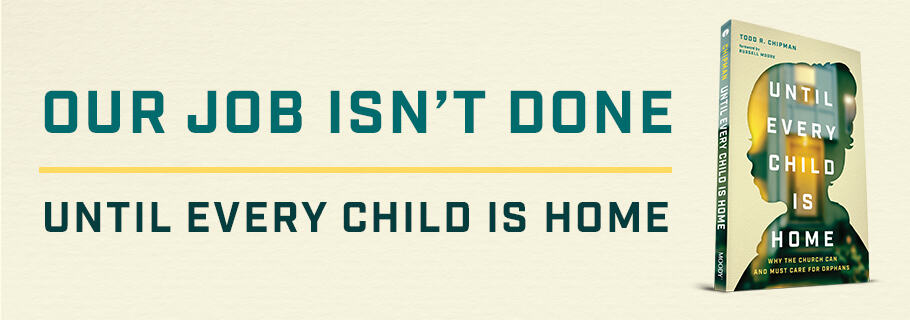This week the blog is sponsored by Moody Publishers and this post is written by Todd Chipman from his book Until Every Child is Home: Why The Church Can and Must Care for Orphans.
I wrote Until Every Child Is Home because I have seen that God’s instruction for His people to care for orphans is not only what we should be doing because He said to and because we find needy kids across the globe, but also because by doing good for kids we are doing good for ourselves.
Orphanhood reflects the plight of lost humanity. Because of Adam and Eve’s sin in the garden in Genesis 3, every human is estranged (orphaned) from God. So there is a sense of irony when Jesus told His disciples, “I will not leave you as orphans.” He was talking in the context of His “farewell sermon,” which took place in the Upper Room on the Thursday night before His crucifixion. Here the apostle John recorded what may be Jesus’ most intimate teaching to His disciples. John began this section by showing Jesus washing the disciples’ feet in John 13 and following it with His prayer for them and the church in John 17. Jesus’ promise, “I will not leave you as orphans,” is the second of three references related to the orphan metaphor in John 14.
Jesus began John 14 by speaking about His Father’s house. This house, Jesus stated, has many dwelling places. The purpose of Jesus’ departure was to go and prepare a place for the disciples to be with Him. His upcoming death, resurrection, and ascension to heaven provides all believers access to God’s presence and guarantees a dwelling place with God for eternity. He told them, “Do not let your heart be troubled; believe in God, believe also in Me” (John 14:1). Why would Jesus tell His disciples not to be troubled? Because their hearts were on the verge of being troubled! Why? Because of what Jesus said in the following verses. His departure was a great threat to them. They felt, as He referenced in John 14:18, like orphans, left alone. But throughout John 14, Jesus was teaching the disciples that His death, resurrection, and ascension guaranteed that they would not be spiritual orphans. Jesus’ departure ensured that His followers would be welcomed by the Father in heaven. As disciples, we have that same guarantee.
The final reference to the orphan metaphor in is John 14:23: “If anyone loves Me, he will keep My word; and My Father will love him, and We will come to him and make Our abode with him.” The presence of a loving father and a dwelling place are exactly what every orphan needs and wants. Jesus assured His followers not only that they will have God as their Father but also that He and the Father will make their home with those who love Jesus. This is the reversal of the orphan condition in the grandest scale! It is impossible for the followers of Jesus to be spiritual orphans because they themselves are the abode of their heavenly Father.
So though John 14:18 is not a proof-text for orphan-care ministries, Jesus did use this metaphor to encourage His faithful followers as they felt orphaned by His departure. But the only way for them or any human to escape spiritual orphanhood was for Him to finish His mission of death, resurrection, and ascension to heaven. That is the gospel message proclaimed in the Great Commission. Jesus’ death, resurrection, and ascension enable believers to call God our heavenly Father and provide for us a forever home with God. The Great Commission was given because of humanity’s orphaned condition. As we speak God’s saving grace and open our homes to needy children, we obey the Great Commission to make disciples of all nations.
I want local churches to see that by coming together to meet the needs of vulnerable kids, we advance our church ministries. Orphan care is strategic, compelling work, a means and not just a goal. Orphan care ministries do not suck the life out of a church—as some might think they would. Rather, foster-care, adoption, and support ministries enhance the general ministry of our local church.
Adapted from Until Every Child is Home: Why the Church Can and Must Care for Orphans by Todd Chipman (©2019). Published by Moody Publishers. Used by permission.









